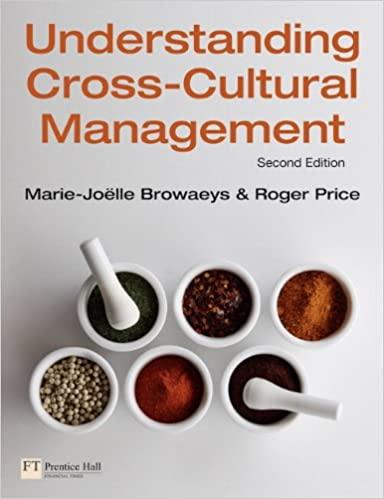What would have been the most appropriate attitude for the Germans to adopt? Explain your choice. a.
Question:
What would have been the most appropriate attitude for the Germans to adopt? Explain your choice.
a. One serious pitfall for ‘universalist’ cultures (Germans) in doing business with the more
‘particularist’ ones (Saudi Arabians) is that the importance of the relationship is often ignored.
The Germans saw the contract as definite, whereas the Arabs perhaps regarded it as only a rough guide or approximation. For the Arabs, relationships have a flexibility and durability that contracts often lack. Particularists get suspicious when hurried. It is important to create a sound rational and trustworthy basis that equates the quality of the product with the quality of the personal relationship.
b. As close working relations develop among the alliance participants, psychological contracts, based on trust and shared goals, replace the formal alliance agreement. Firms that are adept at managing strategic alliances use a flexible approach, letting their alliances evolve as conditions change over time. They not only allocate adequate resources and management attention to these relationships, but also integrate the organizations so that the appropriate points of contact and communication are managed.
c. The only solution for good communication for the ‘linear-active’ Germans should have been to make some concessions towards extroversion. Many find this difficult, even painful, but the rewards for doing so can be considerable. If people keep their distance, just like the Germans did in Riyadh, the Arabs will think that their own physical presence is considered distasteful, or that these people are cold individuals. Arabs speak volubly and earnestly to someone they like, so the contracting party should have also attempted to do the same.
When talking business with Arabs, one must always do so against an intensely personal background. Bad blood Our group, the Venture Group – a mother company in India, with as branch head, Mr. Soota – received an offer to invest $2 million in a joint venture between Brigitte Zankyl GmbH in Munich and DXB-Al Fayed Corporation in Saudi Arabia. The proposed project was to build a plant in a small town near Riyadh to make blood transfusion tubes to sell in the Middle East. The German company had the technical expertise; the knowledge, capital and funding required was to be provided by our company. At this point, Venture was in the process of negotiating the contract.
DXB-Al Fayed was a partner in the business because it had managed to negotiate and win a favourable contract with the government for the purchase of the plastic tubes. The Saudi Arabian company was in a very comfortable position: it had no financial stake in the project and was a 35 per cent partner in the business by virtue of its good contacts with the Saudi government and its in-depth knowledge of the local market.
A few senior managers from our company were asked to go to Riyadh to explore the viability of the investment. Two weeks later, after our managers had returned, the company was more convinced than ever that this was going to be a wonderful project. We only had to wait for another three weeks since the German negotiating party was going to negotiate and conclude the contract after having received the necessary approval from us.
A large delegation of nine people, including lawyers from Germany, prepared themselves for the negotiations.
On the first evening after negotiations had started, we heard by phone from the German side that things were looking good.
Step by Step Answer:

Understanding Cross Cultural Management
ISBN: 9780273732952
2nd Edition
Authors: Marie Joelle Browaeys, Roger Price





